Southern Methodist University
At Southern Methodist University’s Dedman College of Humanities and Sciences, doctoral students in the humanities are not just asking the big questions. They are seeking meaning and context through interdisciplinary and collaborative study of the human experience.
At SMU, the humanities are valued for their ability to help us understand the world we live in, preserve the great accomplishments of the past and imagine what might come in the future. Here, humanities scholars are encouraged to move beyond traditional thought and study of works or things, and instead focus on the themes, structures and ideas that help us determine what it means to be human.
If a passion for history, literature or religious studies is driving you to consider a doctoral degree, this guide will help you understand SMU’s unique approach to the study of the humanities and prepare you to apply to a PhD program with confidence.
Read on to learn more about doctoral programs in English, History and Religious Studies SMU.
What is
a PhD in Humanities?
The humanities focus on the potential and agency of human beings — considering humans as the starting point for all serious moral and philosophical inquiry. By studying literature, history and religion through a humanist lens, we seek to understand the themes of life’s “big questions” rather than to provide or understand the answers.
Doctoral study of the humanities involves imagination and speculation to determine what might have been based on limited solid evidence. In this way, doctoral study of the humanities is focused on human beings as the catalyst to great change through use of the imagination. The farther we move from the particulars or that which might be empirically proven, the closer we come to true study of the humanities.
Who Should Get a PhD in the Humanities? Is a PhD Worth It?
Regardless of your course of study, earning a doctorate degree is no easy feat. Deciding whether a terminal degree is the right path for you should ultimately be based on your undergraduate degree, your research interests and your future goals.
(Read about the best PhD programs for English majors on our blog)
The most successful humanities PhD students are individuals who want to study and explore the “big” questions in life.
Those who pursue humanities are interested in exploring culture and our world through history, arts and literature, and religion. They are inquisitive, and while they may not be the ones physically making change they are often the catalyst.
For students in some fields, pursuing a PhD is seen as a means to an end — the necessary step to qualify for a certain career or perform specific research. Those who seek terminal degrees within the humanities, on the other hand, are most often those who want to develop a deeper understanding of a subject for the sake of exploration and discovery.
A PhD May Be Worth It For You If
-
You are interested in pursuing original research
-
You want to work closely with faculty and experts in your subject
-
You are willing to commit six years to furthering your education
-
You want to pursue a career in academia or another specialized field that requires a terminal degree
Only you can decide if a PhD program is right for you. The path to a doctorate degree is challenging and time consuming, but those who are passionate about their subject and their research rarely regret the decision to further their education.
Access our Free
Downloadable Guide
Explore a
PhD in English
Weight the pros and cons of pursuing a humanities PhD in English by considering not only tuition, future salary, and career goals but also the chance to engage in original research to make an impact.
Access Insider Information!
Tenure Trajectory: Are There Jobs in Academia Anymore?
The job market for future professors is different than it once was. The reduced hiring of tenure-track faculty in Humanities departments across many colleges and universities has made it difficult for those with PhDs to find gainful employment within academia. The humanities specifically has more PhDs than available jobs in academia.
However, that doesn’t mean one should forego advanced study if they’re passionate about the field and their research interests. Those who seek a PhD in a subject within the humanities rarely do so because they are concerned about the return on investment for their degree or a boost to earning potential. Instead, many humanities PhDs pursue this challenging and rewarding path for the sake of expanding their own knowledge and understanding of life’s big questions.
Humanities PhDs Aren’t Limited to Work in Academia
If passion is driving you to pursue a PhD in the humanities, know that there are many fulfilling job options that would greatly utilize the skills and knowledge gained in a doctoral program. In fact, there is much evidence to show that humanities PhDs not only find work outside of academia, but thrive in government, nonprofits and industries.
According to the American Academy of Arts and Sciences, humanities PhDs are employed in nearly every occupational sector. One reason may be that these scholars possess a set of skills highly sought after by employers.
Some skills and abilities humanities PhDs possess that can help with career placement outside of academia include
![]() Excellent research capabilities
Excellent research capabilities
![]() Strong and concise writing skills
Strong and concise writing skills
![]() Ability to form cogent arguments
Ability to form cogent arguments
![]() Time and workload management
Time and workload management
![]() Work with complexity and ambiguity
Work with complexity and ambiguity
![]() Adaptability
Adaptability
![]() Emotional intelligence
Emotional intelligence
As the economy recovers from the COVID-19 pandemic that left many businesses and organizations scrambling in 2020, Humanities PhDs are uniquely positioned to think creatively and critically about these unprecedented challenges. The traits and skills that make one a successful humanities scholar are the same that lead to new insights into everything from poetry and paintings to business models and politics. These “soft” skills are among the most desired employee traits in LinkedIn’s annual Global Talent Trend report, and make humanities scholars highly employable and sought after outside of academia.
Possible Careers for Humanities PhDs
Research from Columbia University Center for Career Education shows that PhDs who work outside of academia are regularly sought for positions in research, writing, public service, consulting, advising, teaching and publishing.
HIGHER EDUCATION ADMINISTRATION

For many PhDs seeking employment outside of academia, the higher education industry can be a source of employment. Many non-faculty careers within higher education (and other educational organizations) require the interest and skills developed in a humanities PhD program. Some non-academic areas PhDs often excel in include teaching/writing centers, marketing and public relations, and student and academic affairs.
SECONDARY SCHOOL TEACHING

FEDERAL GOVERNMENT

Many skills held by PhDs in the humanities are useful to a range of governmental bureaus. PhDs with extensive knowledge of language and culture can be strong employees in the Department of State, Department of Defense, and the National Endowment for the Humanities, to list a few. Employment opportunities for humanities PhDs exist in nearly every government sector.
NONPROFIT ORGANIZATIONS

Work in the nonprofit sector spans a wide range of specializations and interests, including health, education, religion, art and charitable organizations. Humanities PhDs in particular thrive in nonprofit organizations due to the ongoing need for grant writing, research, fundraising, program evaluation and program development.
ACADEMIC AND NON-ACADEMIC PUBLISHING

For some PhDs, work in academic publishing allows them to remain involved with scholarship while putting their skills in writing and editing to use. Careers in academic publishing can include literary and academic journals or educational publications such as textbooks and materials for secondary schools, colleges and universities.
For those who are less concerned about remaining involved with scholarship, careers in non-academic publishing of trade books, popular fiction and nonfiction, and consumer magazines. Many PhDs find their skills translate well to careers in editorial, management, marketing, sales, production and design.
Get the Graduate Student's Guide to Living in Dallas
The Humanities at SMU
Individuals who pursue a PhD in the humanities at SMU are interested in understanding the world today and making connections to positively impact current climates and the future. PhD candidates in the Dedman College of Humanities and Sciences benefit from superior training, top notch mentoring, and professional development.
The humanities graduate department in Dedman College of Humanities and Social Sciences at SMU is made up of three subjects:


Humanities PhD programs at SMU are interdisciplinary and collaborative by nature. PhD candidates in the humanities are able to take on both formal and informal interdisciplinary study by taking classes outside of their specific program and connecting with faculty and students in other disciplines.
PhD Students at SMU are encouraged to take courses outside of their core subject as well as courses specifically within the social sciences. Engaging in diverse group discussions and varied research approaches can add context and perspective to a student’s own research, helping to create a more nuanced understanding of topics and source materials.
PhD Funding
There are many opportunities for funding within the humanities at SMU, including fellowships, grants and assembly funding. SMU recognizes outstanding PhD students through two fellowships awarded at the time of admission: University PhD Fellowships recognize PhD students who show great promise for academic success, and Mustang Fellowships recognize PhD students who show great promise for academic success and potential to enhance graduate program diversity at SMU.
Professional and Career Development
PhD students at SMU have access to career counseling and professional development opportunities through the Moody School of Graduate and Advanced Studies. In addition to networking and professional development events, students can meet with a career specialist to discuss:
-
Building your resume
-
The academic job search process
-
Searching for jobs outside of academia
-
Interview strategies and tips
-
General questions about planning a career post-PhD
Learn More About the $100 Million Gift from the Moody Foundation
Human Perspective: Meet Faculty in the Humanities Department
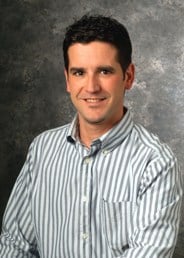
Richard R. Bozorth,
Associate Professor and Chair
English Department
What courses do you teach at SMU and how long have you been teaching here?
I have been teaching at SMU since the fall of 1998. I have taught classes in poetry, British literature, and—at both the undergraduate and graduate levels—courses in Modernism, 20th-century British literature, and LGBTQ+ studies.
What is the highest degree you hold and where did you receive it?
I received my PhD in English from the University of Virginia.
Did you always want to work/study in the field of English, or did you have other plans?
Like many an undergraduate English majors, I thought I wanted to go to law school. When I realized how bored I would be with the kind of work so many lawyers do, I looked for ways to keep reading and thinking about literature—thus, graduate school and becoming an English professor.
What area of research do you specialize in within the field of English?
My research focuses on 20th-century literature, especially poetry and British modernism, as well as LGBTQ+ studies. These interests have coincided in my research and scholarship on W. H. Auden and other queer poets.
What do you most think is most unique or valuable about the English program and the department at SMU?
This is a relatively small department, teaching relatively small classes at all levels, but with a first-rate faculty engaged in scholarship that spans English studies. So students get lots of close attention from faculty who are plugged into their fields and the profession. And doctoral students have opportunities to teach undergraduates in a variety of classes that allow them to teach things in their own fields, as well as other areas. That’s proven to be a real asset for our PhD’s on the job market.
Is there anything else you’d like to add?
Getting a PhD requires concentration and the willingness to keep going at times when you aren’t sure where you’re headed. The key thing for me—particularly at the dissertation stage—was that I had found something that didn’t just have professional and intellectual value. It was something that I loved thinking about. That’s what got me through, along with supportive and wise faculty advising me.
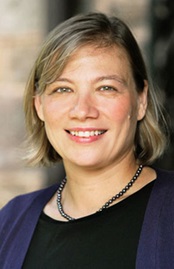
Kate Carté,
Associate Professor
History Department
What courses do you teach at SMU and how long have you been teaching here?
I teach early American history, and the history of American religion. I’ve been at SMU for nine years.
What is the highest degree you hold and where did you receive it?
I have a PhD from the University of Wisconsin-Madison.
Did you always want to work/study in the field of History, or did you have other plans?
History was always my passion, but I also considered being an archivist or a policy work in Washington.
What initially interested you in teaching at the graduate level? What brought you to SMU?
I love working with graduate students. We have the time and space to get to know them well, and I learn so much from their interests and explorations.
What area of research do you specialize in within the field of History?
My research focuses on how religion intersects with some of the other big forces of history, such as economics or politics. I study religion because that’s often the place where people “put” what matters most to them.
What research have you been involved in at SMU? Other places? Do you have a favorite research project?
My favorite is whatever I’m working on! I just finished a long project on religion and the American Revolution, and now I’m starting one on religion, cartography, and categories of human difference in the early modern English Atlantic world.
What do you most think is most unique or valuable about the History program and the department at SMU?
It’s a smaller program, but that means we can really tailor what we do to each student. Our traditional focus on the Southwest borderlands has expanded into much wider realms, and now we have students working in many areas of US history, including the colonial period. At the same time, the program is still small enough that there is a lot of intellectual exchange between students and between students and faculty.
Why do you think History is an important and valuable field to study?
A lot of people think studying history is learning about the past, but I don’t think that’s true. Studying history is building a conversation between the past and the present. It’s about understanding how our world came to be, by asking the questions that are on our minds. Every community needs historians to anchor it, to reassure it, and to prod it to change and accountability.
What about studying History at the PhD level poses the biggest challenges for students (choosing an area of interest, their dissertation)?
Because the humanities are frequently under attack, there are always lots of concerns about jobs at the end of the degree. That fear and pressure can be hard for students to manage.
What research areas are most popular among the students?
We have a lot of students who work in the Southwest borderlands, but we also have a growing cluster in US political history. We also have several who do US religious history, and even(!) the colonial period.
Are there any emerging trends or developments in the field that you find exciting?
Always! It’s an ongoing conversation.
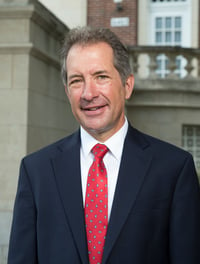
Steve Long,
Professor of Ethics
Religious Studies Department
What courses do you teach at SMU and how long have you been teaching here?
I began teaching at SMU in 2015. I teach courses in theology and ethics. I also teach the core course in the doctoral program, “Philosophy of Religion” that examines both philosophical theology and philosophy of religion.
What is the highest degree you hold and where did you receive it?
I received the PhD from Duke University.
Did you always want to work/study in the field of Religious Studies, or did you have other plans?
I was an organic chemistry major in college, and thought for a time that I would be a medical doctor. I went to seminary to prepare for ordination in the Methodist Church and was still considering medical school at the time. While in seminary I fell in love with studying theology and ethics and decided to continue my studies after receiving my Master’s degree. For some reason, I never tire of reading theology, philosophy, and ethics.
What initially interested you in teaching at the graduate level? What brought you to SMU?
Graduate students keep you on your toes. Sometimes you need to work to interest undergraduates in your courses, but graduate students have strong motivation to learn and study. I discovered early on that graduate students make me a better scholar and teacher.
I was originally asked to apply for the Maguire Chair at SMU but was not looking to leave where I was. I finally decided to apply and came to visit. The communal sense among the graduate students was a strong draw for me. I have not been disappointed.
What area of research do you specialize in within the field of Religious Studies?
I’m a bit odd as a scholar in that I am a generalist. If you looked at my publication record, you might think that it is very eclectic and wonder if anything holds it together. I can trace lines of continuity through the diverse works but others might not so readily find them. What always interests me is moral philosophy, moral theology, and politics. Everything I have written, I think, falls under the intersection of those three disciplines.
What research have you been involved in at SMU? Other places? Do you have a favorite research project?
Right now I’m working on a book on what it means to teach and learn ethics focusing on the role of the theological virtues of faith, hope, and love. I find teaching ethics to be fascinating and complicated. In fact, it is fascinating because it is complicated. How do we bring together people from a diversity of backgrounds and discuss matters that concern us to the core of who we are as people?
What do you most think is most unique or valuable about the Religious Studies program and the department at SMU?
Friendship. We have a collaborative program where our students assist each other in learning and in so doing contribute to the faculty’s education. We also have a very good faculty that treat each other with respect.
Why do you think Religious Studies is an important and valuable field to study?
For good and for ill, religion affects every aspect of human existence. If you are unaware of its intricacies, you will be inept at discerning and discovering what it means to be human, for yourself and for others.
What about studying Religious Studies at the PhD level poses the biggest challenges for students (choosing an area of interest, their dissertation)?
Learning how to research and write a dissertation is a skill that takes time and tenacity. Getting through coursework, learning languages, and completing assignments can be challenging but nothing like completing a dissertation. It prepares students for a life of scholarship.
What research areas are most popular among the students?
Our students seem attracted to theology and ethics, but we have many strong research areas and one of the strengths of our program is the encouragement to study broadly.
Are there any emerging trends or developments in the field that you find exciting?
There are always surprises that arise that require constant attention. For instance, when I was in graduate school we assumed that we were at the end of a discipline known as “metaphysics.” Then it returned, requiring both rediscovery of what we thought had been left behind and new possibilities for what lie ahead. There are trends that were just trends that led me into intellectual dead-ends, and developments that made me rethink things. The philosopher Wittgenstein said that philosophy (and I would add religious studies) is more like exploring an old city that always contains more than you are aware of at any one time.
Is there anything else you’d like to add?
I have now supervised over thirty doctoral dissertations and sat in on many more dissertation committees. Each one was different, tailored to the student’s interest. Supervising them is a labor of delight. You observe a student with a general thesis begin to work on their project. At first it is rather vague and unclear—like viewing something at a distance. Then it gains shape and form; clarity emerges until finally it is ready to take its place among the traditions of wisdom that make for human flourishing. To be part of this process, to see it take place again and again, remains deeply satisfying without diminishing its mysteriousness. I could not imagine a more enjoyable exercise than passing along sacred wisdom from one generation to the next.
Advancing the Field
Stories and Resources for Graduate Students
Advancing the Field is a weekly blog that offers prospective graduate students insight and advice as they consider the challenges and exciting possibilities that come with getting a graduate degree.
Ready to Read More? Subscribe to Our Blog!
Humanities PhD Programs
PhD in English
Students seeking a PhD in English at SMU have the opportunity to learn from a distinguished faculty of scholars and dedicated teachers. All faculty members, including senior professors and researchers, teach regularly. English PhD students benefit from a one-to-one student-faculty ratio, ensuring small seminars and ample options for tutorial studies.
English faculty offer coursework and research supervision in most areas of literary study, including:
-
British and American literature
-
Courses in literary theory
-
Literature written in English by
non-Western writers
-
Critical and rhetorical theory
-
Cultural studies
-
Women’s studies
Our aim for the doctorate in English is to graduate comprehensively trained scholar-teachers prepared to assume college and university positions, as well as a range of other non-academic jobs that benefit from advanced academic preparation.
We are committed to ensuring our graduates’ professional success through our program featuring:
-
Fellowships for all doctoral candidates for six full years at extraordinarily competitive rates, followed by the opportunity for a seventh year as a Visiting Assistant Professor.
-
Medical benefits, tuition waivers, summer seminars in Taos, NM, and professional travel support for all doctoral Fellows.
-
Opportunities for doctoral Fellows to teach writing and literature classes, beginning in year two.
-
Dissertation-year support for all doctoral Fellows.
-
Close mentoring from matriculation to and beyond graduation.
![]()
![]() Get more information about the PhD in English, including admission requirements, curriculum, and course descriptions.
Get more information about the PhD in English, including admission requirements, curriculum, and course descriptions.
PhD in History
Students seeking a doctorate in history at SMU have the opportunity to study with faculty members who are dedicated teachers and distinguished scholars, specializing in fields that cover the globe. They believe that the study of the past offers students critical and analytical skills essential not only to the discipline of history but also to their future careers.
The course of study explores historical experiences in American, transnational, and global contexts, with special emphasis on advanced work in
-
U.S. Southwest
-
U.S. West
-
Mexico
-
U.S. political, diplomatic and/or
presidential history
-
Ethnic Mexicans
-
Native Americans
-
Borderlands
-
Specialized global/comparative themes, such as gender, democracy, and capitalism
The strengths of the graduate program in the areas of borderlands, transnational, global, and comparative history will prepare students to produce innovative scholarship, teach in a wide range of higher educational institutions (including community colleges, liberal arts colleges, and research universities), and pursue careers outside the academy (in historical archives, museums, and other public history institutions).
The program offers unexpected opportunities for historical scholarship to broaden and deepen students’ knowledge. Resources include:
-
The Clements Center for Southwest Studies, which promotes research publishing, teaching and public programming in a variety of fields of inquiry related to Texas, the American Southwest and the U.S.-Mexico borderlands.
-
The Center for Presidential History, which allows for research in the domestic and foreign affairs of the United States.
-
The George W. Bush Presidential Library and Museum, which serves as a resource for the study of Bush’s life and career while promoting a deeper understanding of the presidency, American history and public policy.
We are committed to ensuring our graduates’ professional success through a program featuring:
-
Fellowships for all students accepted into the PhD program, guaranteed for a period of five years for those whose work remains excellent.
-
Fellowships include tuition, fees, health insurance and a $20,000 stipend for the academic year with additional competitive fellowships available through the Moody School of Graduate & Advanced Studies.
-
Resources available for travel to professional conferences and to research archives
![]() For more information about the History PhD program, including admissions requirements, curriculum, and course descriptions, visit the History PhD program page.
For more information about the History PhD program, including admissions requirements, curriculum, and course descriptions, visit the History PhD program page.
The International Applicant's Guide to a PhD
Are you an international student considering graduate study in the United States? Our Guide to International Admissions has all you need to apply to earn a PhD in the United States with confidence.

We'll email you a PDF of the eBook, so you can save it for your reference as you apply to graduate school.
View the Recorded Webinar
PhD in Religious Studies
The department of Religious Studies fosters a greater understanding of the roles of religion in the contemporary world and throughout history. The study of religion at SMU is interdisciplinary, employing methods drawn from across the humanities and social sciences to examine the world’s religious traditions as social, cultural, and historical phenomena. The PhD program is designed to prepare persons for academic leadership and professional careers as teacher-scholars in school, colleges, universities, schools of theology.
Students focus their work in one of six specialized fields of study:
-
Hebrew Bible/Old Testament
-
New Testament
-
History of the Christian Tradition
-
Religion and Culture
-
Religious Ethics
-
Systematic Theology
![]() For more information about the Religious Studies PhD program, including admissions requirements, curriculum, and course descriptions, visit the Religions Studies PhD program page.
For more information about the Religious Studies PhD program, including admissions requirements, curriculum, and course descriptions, visit the Religions Studies PhD program page.
Read Our Blog:
Set Yourself Apart: Earn Your Humanities Doctorate at SMU
If you are ready to explore life’s biggest questions and their implications, a PhD in English, History or Religious studies from SMU will help you gain a deeper understanding of the human experience. You will have the opportunity to research the nuances of life and the universe through study, collaboration and thoughtful discussion with other bright and curious minds.
Whether you are ready to apply or want to know more about faculty, research and opportunities in a PhD program, the humanities department at Dedman College are excited to help you find your place at SMU.
FOR INFORMATION ABOUT OUR PROGRAMS OR
ASSISTANCE WITH THE APPLICATION PROCESS, PLEASE CONTACT:
Stevie Otto
Director of Recruitment and Admissions
Moody School of Graduate and Advanced Studies
Southern Methodist University
Telephone: 214-768-4345
Email: smugrad@smu.edu
Graduate application: smu.edu/gradapp
JUMP TO SECTION
- Should You Get a Ph.D.? Exploring the Reasons to Get a Terminal Degree
- You’ve Decided to Go for It! Getting Started on Your Ph.D. Journey
- Putting Together an Strong Ph.D. Application
- Understanding How to Finance Your Ph.D. Program
- Advice from Current Ph.D. Students
- Looking Ahead: SMU’s Advice for the Ph.D. Years
- Ph.D. Programs at SMU: A Look at Your Options Across the Disciplines
- Want to Learn More?

Request More Information
Are you curious about what the next step towards grad school should be? Want to learn more about SMU’s 32 Ph.D. programs?

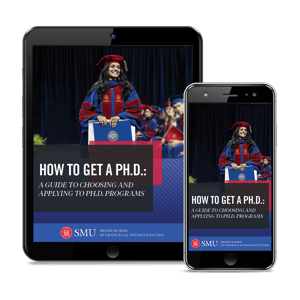
![[SMU] Dallas Guide eBook_iPad mock-up](https://grad.smu.edu/hs-fs/hubfs/Dallas-Guide/%5BSMU%5D%20Dallas%20Guide%20eBook_iPad%20mock-up.png?width=300&name=%5BSMU%5D%20Dallas%20Guide%20eBook_iPad%20mock-up.png)
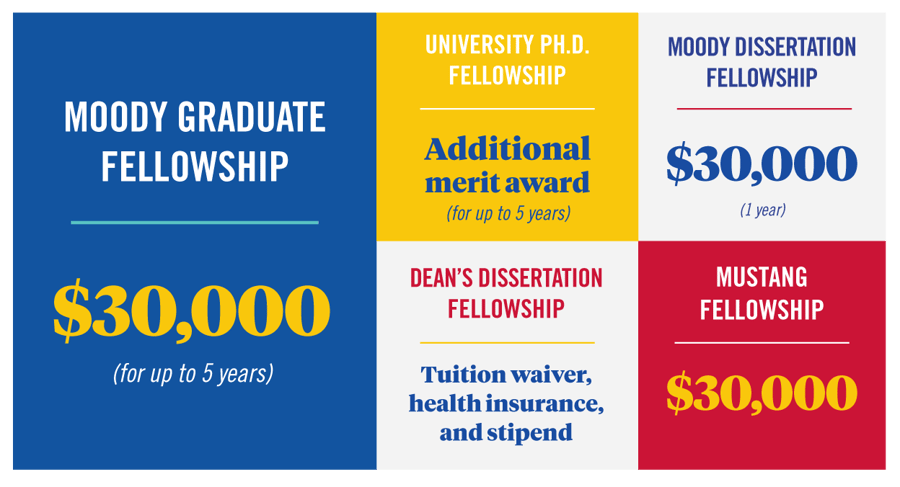
![[Moody Guide] Mock Up](https://grad.smu.edu/hs-fs/hubfs/%5BMoody%20Guide%5D%20Mock%20Up.png?width=300&name=%5BMoody%20Guide%5D%20Mock%20Up.png)


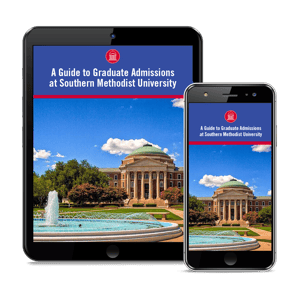





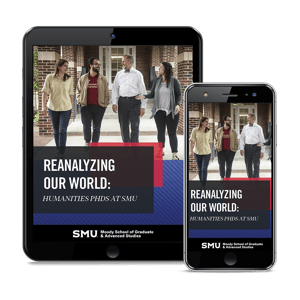







Objective study of humans and their social relations using a scientific and evidence-based approach
Includes fields such as anthropology, economics, political science, psychology and sociology
Involves scientific and other research methods
Subjective study of humans, our history, culture and societies using an analytical and critical approach
Includes fields such as philosophy, history, literature, languages and religious studies
Does not involve scientific research